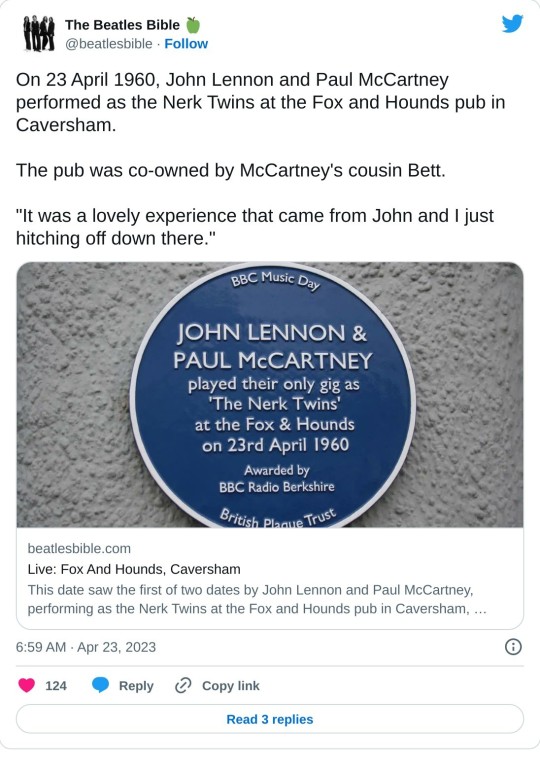#the nerk twins
Photo
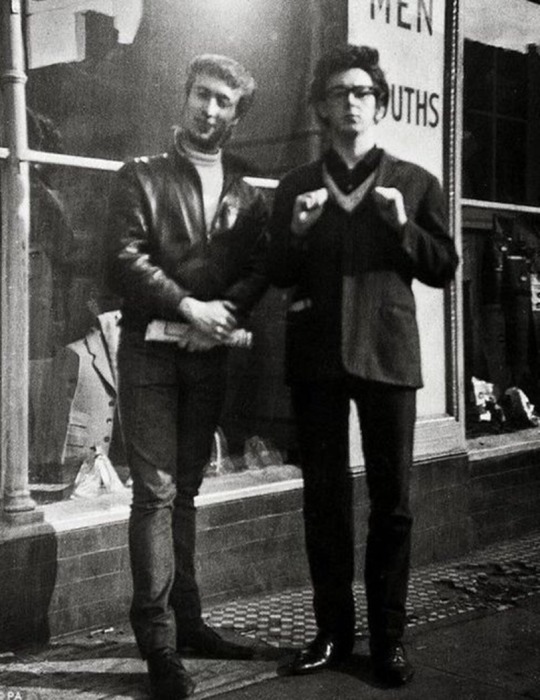
Back in 1960, a duo named The Nerk Twins, comprising John Lennon and Paul McCartney, performed an acoustic set at the Fox and Hounds in Caversham, Berkshire.
296 notes
·
View notes
Text
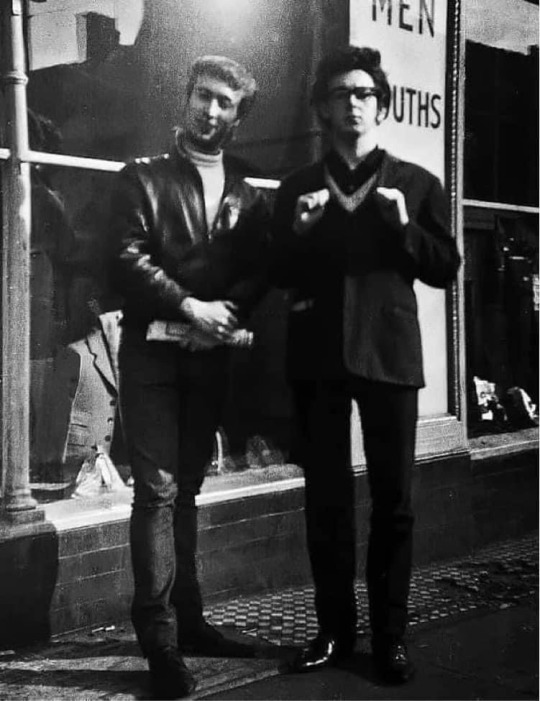
The Nerk Twins on the occasion of their one and only public performance.
4 notes
·
View notes
Text

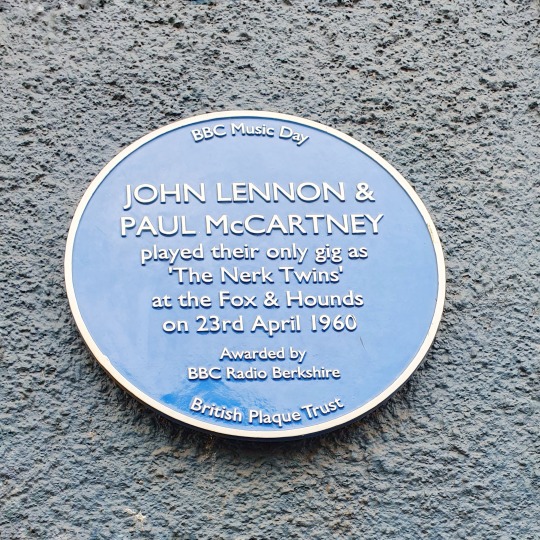
took a little trip to the fox and hounds in caversham to celebrate the anniversary of the nerk twins playing 64 years ago today!
#mclennon#nerk twins#the beatles#john lennon#paul mccartney#and i read one of my fave mclennon fics about it on the train there#dream day
268 notes
·
View notes
Text
"The Locarno was just 50 yards from the Grafton on West Derby Road. On this occasion the group personnel was just John, Paul and myself. Len had already departed on and on this particular night Eric was ill. Sitting in the green room waiting to go on, we noticed a poster on the wall advertising another talent contest scheduled for the next weekend. It was a bit different from usual, however, in that it was specifically for male singers - either as solo acts or duets, not groups."
Colin remembers that the poster clearly excited Paul's interest, who immediately drew it to John's attention, commenting, "We could do that - we could enter that as a duo."
Without hesitation John emphatically replied, "No, I'm not doing that, we're a group."
Colin looked anxiously to see what Paul might have to say about John's rebuttal, but he didn't say a word.
"That was the end of the discussion. In my presence, Paul never suggested it or anything like it again. This was a sign to me that for all Paul's growing influence, John was still most definitely the leader of the Quarry Men. It signalled John as a group player, whereas Paul might possibly be persuaded otherwise. Paul had the confidence to go out on his own. I thought he would have dropped the rest of us quite easily if John had been up for it, but John was less comfortable on his own, he liked the support of his band around him. This is why he struggled with asking Pete Shotton to leave, he like people he trusted around him. It's most probably why I survived to long - and why, later on, in my opinion, George was recruited in the way that he was and Nigel handed the job of actually sacking Eric."
Pre:Fab!: The Story of One Man, His Drums, John Lennon, Paul McCartney and George Harrison, Colin Hanton and Colin Hall (2018)
32 notes
·
View notes
Text
23 April 1960

The Nerk Twins perform the first of only two gigs at the Fox & Hounds in Caversham.
They probably won't go anywhere. Look at them.
133 notes
·
View notes
Text
"The admission of Stuart into the band may have seemed a simple solution to an ongoing problem, but it also created a new tension. John didn't have a monopoly on jealousy. Paul could be jealous, too. Once it had been John and Pete Shotton, inseparable friends and partners, and, as Pete had noticed, John always needed a partner. Then Paul had replaced Pete, and Lennon and McCartney had been born. Over months that friendship had grown into something more than the swapping of chords and lyrics, and the high harmony that Paul would sing over John's lower voice. In fact that Easter of 1960 John and Paul would even sing as a duo, when they hitch-hiked to Caversham in the south of England where a friend was running a pub. For a week, John and Paul, who had to sleep together in the same single bed, would entertain the regulars under the name the Nerk Twins. They were best friends and there was a mutual admiration between the two. While John would always recognise Paul's greater gift for melody and musical craft – no matter what he might sometimes say years later – Paul admired John for his unalloyed bravery in speaking his mind, and his ability to summarise a thought in a single, often witty, line. There was more. When John had been living at Mendips, Paul would sometimes go over on his bicycle to find him at a typewriter in his bedroom composing a nonsense piece. Or, perhaps, it might have been a poem that John was writing – something that played with words and images in the style of Dylan Thomas by way of radio star Stanley Unwin, whose corruption of everyday English turned sentences into clever-sounding nonsense. John liked to call that style gobblede gook, a wartime word he'd picked up from the radio, when presenters poked fun at seemingly unintelligible official documents. Always a great talker, John loved words and slogans and enjoyed bending and reshaping their meanings. And Paul, who was studying English Literature at school, and seeing himself as a culture vulture, was impressed. At one point the two even started to write a play together, before quickly deciding that they didn’t know what to write about and that song lyrics were more their metier. So, with a friendship that was now based on more than music, it was inevitable that, with the introduction of Stuart to the group, Paul began to feel like an outsider. It was hardly Stu's fault that John had dragged him into the band. But feeling increasingly cast aside, the perfectionist in Paul couldn't help hearing the wrong notes the new bassist was playing. John would have heard those wrong notes too, but must have consoled himself with the thought that, given time, Stuart would improve. He would, but he would never be good enough. When the occasion demanded, however, John had an infinite capacity to deny the evidence of his own ears."
ㅡ From the book "Being John Lennon" by Ray Connolly.
#john lennon#paul mccartney#lennon mccartney#the beatles#nerk twins#ray connolly#my:read#being john lennon
150 notes
·
View notes
Text
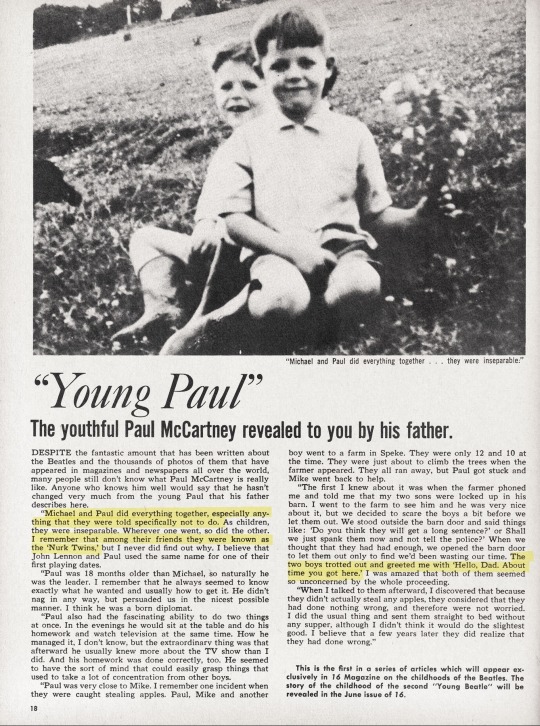
From @mccartneyist on Twitter
57 notes
·
View notes
Text
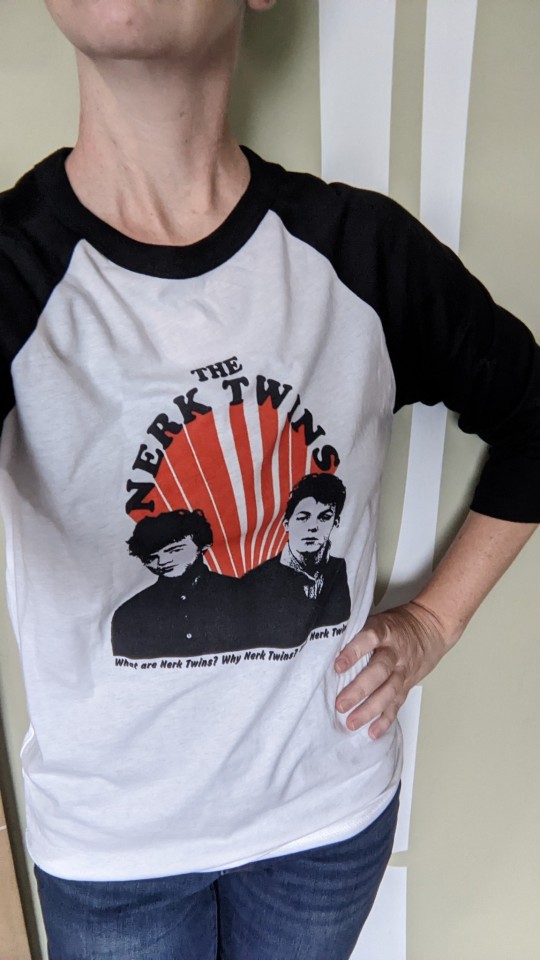
Ready to take on the world with references no one will get.
54 notes
·
View notes
Text
a biopic centered around john and paul as teens writing songs together, with the backdrop of their difficult family situations underpinning how music was a form of escape… that's all.
18 notes
·
View notes
Text
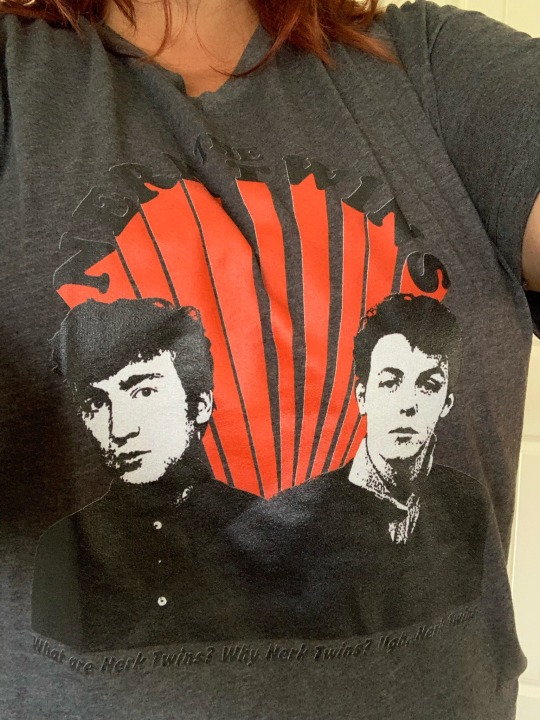
It’s here!
@mydaroga am I one of the cool kids now?
9 notes
·
View notes
Note
Hi, I would love recs for mclennon fics dripping in sexual tension, like six hours in August by stonedlennon. It doesn't need to have explicit sexual content. Thank you!
Thank you so, so much for this ask—this is a category of fiction I personally enjoy *a lot* (imagine Paul's "I slept with John..." pronunciation).
Here are some favorites that came to my mind. Some have sex on the page, others do not; I remember all of these as having excellent Tension™. I hope you find something you like here!
Young J/P:
Streets of Your Town (@with-eyes-closed): Sensual. The upheaval in young Paul's mind as he falls in love with music and John, without putting a name to it. As of yet unfinished, but it's so good I rec it anyway, because it's...[read to find out, take a fan]
All I Know Since Yesterday (RedheadAmongWolves): Paul and John's first kiss at Paul's, after long, sweet hours of trembling fear/excitement. Paul POV.
The Way Things Sometimes Are (@paisanas): Young John is troubled and pining for Paul. Paul is mesmerizing through his eyes.
now and then (there's a fool such as I) (@stonedlennon): The Nerk Twins take the bus to Caversham and share a bed. You can smell the summer grass and the sweaty leathers...
(Ain't no cure for the) summertime blues (orphan_account): John and Paul alone on a hot summer day.
The Photograph (thinkpink20): John finds a Photograph Mike took of Paul and notices...things.
Hamburg:
ageless children, animal sweat (eyeball2eyeball): Read this story to spend time in John's throbbing, unhinged Hamburg mind. No sex on the page, and yet. It's *everywhere*. For such a short story, it takes up a lot of room in my brain. The Paul in this story is one of my favorite Pauls.
Sinful City (thinkpink20). Days and Nights in Hamburg. Paul needs John, and stops questioning things.
In Margaret Asher's music room:
Tell You Something (@louiselux). Lennon and McCartney write "I Want to Hold Your Hand." The tension rises.
In or near Paul's Geodesic Dome:
shotgunning (@pauls1967moustache): John and Paul languidly try something new...
Chrysalis (cloudy_blue): Tension in 1967. Hypnotic and stylish, I love it.
Stop all the Clocks (@javelinbk): After Brian's death, John and Paul retreat to Scotland. Grief and awakening ensue...slowly and sweetly.
Greece:
Way Up Top (@boshemians). Snapshots of J/P desire and spiraling doubts, contained in the Beatles' trip to Greece to buy an island.
Nineteen Sixty-Eight:
Outro (bakerstreetafternoon). From the Summary: 'Had it been this tension that had kept them together? Had it always?'
Bad Luck to Talk (7intheevening): Paul chats with JohnandYoko at a party and follows them home for a cup of tea. What hurts more exquisitly than pining? Unacknowledged pining.
John I'm Only Dancing (@skylikeaflame): Amidst the insanity of the Mad Day Out, desire erupts relentlessly.
The 70's as they should have been:
Down on the Farm (RosalindBeatrice): Incredibly hot and realistic (and funny in just right amounts!). John visits Paul in Nashville; Paul shows off Wings and the family, John stays the night. Dot dot dot.
I can only speak my mind (@paisanas): John's diaries are leaked to the press and printed; Paul reads them. What follows is the sexual awakening of James Paul McCartney as he reads of John's feelings for him. First rate pining, past and present.
I still miss someone/ I know that I miss you, but I don't know where I stand/ close the door lightly when you go (RosalindBeatrice): John and Paul meet in 1976. There is a spark. Few and far between meetings follow.
The Other Eighties (John lives and experiences sexual tension with Paul):
and when broken bodies are washed ashore (who am i to ask for more) (wardo wedidit): John divorces Yoko and visits Paul in Scotland. Soul searching and relationship mending.
The Birthday Party (@merseydreams): John and Paul meet at Ringo's Birthday Party. There is only one bed.
Tension through the Years:
Smoke Gets in Your Eyes (@savageandwise). John is turned on by Paul smoking. 1958—1969.
#asks#fic recs#tension fic recs#mclennon#mclennon fanfiction#mclennon fic#tension#pining#slow burn#all the good things#beatles fanfiction
152 notes
·
View notes
Text
who’s who in “let ‘em in” by wings (1976)
and some other thoughts on the song
prefacing this by saying that paul himself has changed his own interpretations and offered many explanations up for each name mentioned in the song! i don't necessarily think there's one right answer about what's about who - paul is known for writing about multiple things at once and having many layers of inspiration behind his lyrics. i will mostly be focusing on the names paul lists off within the song, in the order they appear, starting with:
- sister suzy: suzy was linda mccartney's alter ego within her own band, suzy and the red stripes which was active at the time this song was written. paul has stated on many occasions, including in “the lyrics”, that sister suzy is a reference to linda.
- brother john: a lot of articles reference brother john as being john eastman, linda's brother, while others reference john lennon. paul himself said it could be either. but if we're being honest, the first person paul's gonna think of when someone says “john” is lennon, hands down.
it's worth noting the use of sister when describing linda, paul's wife. while it could make sense in the context of the line brother john being john eastman (john and linda being actual brother and sister to one another), i think it's valid to examine the other potential meanings as well, particularly if we think of brother john as john lennon. it places paul's relation to them both as, firstly, familial and implies an equality in the roles they've served within paul's life. starting the list of people with linda (placing her as the most important as the lot) and then john second is interesting as well. we've seen countless examples of paul and john both comparing their relationships with their wives to their relationships with each other and i think it's striking that paul does this here, whether consciously or not.
(nowadays, paul's brother and sister in law via his wife nancy are actually named jon and susie, coincidentally enough.)
- martin luther: paul writes in "the lyrics" that this is about MLK which i'm sure it partially is but also there is an account of the other three beatles jokingly calling john "john martin luther lennon" in the early days though i couldn't find a solid source for this. there is the infamous 1985 hunter davies quote from paul's off the record phone call with him where he called john “martin luther lennon" but that was obviously years after let 'em in and in a massively different context (though potentially this could suggest that it’s a comparison he’s mentally made before but that’s a bit of a stretch, evidence wise lol). i’ve also heard people say martin luther could potentially be a reference to george martin as well, which is possible. others have speculated that this is a reference specifically to martin luther and the 95 theses (“knocking on the door" i.e. nailing the theses to the door) which paul says may have been true on an unconscious level but wasn't purposeful.
- phil and don: the everly brothers, one of paul and john's earliest and biggest influences as young lads. they were heavily inspired by the everly brothers when they performed as their duo, the nerk twins. they also referred to themselves as the foreverly brothers on other occasions.
- brother michael: paul's brother mike, unsurprisingly. though paul also states in “the lyrics” that this might have been a reference to michael jackson as the timing works with paul and linda meeting the jackson 5 around the same time as well but i think realistically he probably mostly had mike mccartney in mind with this one.
- auntie jin: paul’s real and favourite auntie from liverpool. saw one very rogue take that it’s meant to sound like ‘antigen’ but, quite frankly, i think that’s a bit horseshite.
- uncle ernie: in “the lyrics”, paul mentions that he has a cousin called ian who was sometimes referred to as "ern". but also states that at this point he was just playing with words and sounds and this probably wasn't his intention. previously, paul has attributed the line as a reference to keith moon, who was close to the mccartneys in the 70s prior to his death and played the character of uncle ernie in the film tommy (1975). it also could refer to ringo starr as well, as he voiced uncle ernie in the LSO's recording of tommy. ringo himself referenced let 'em in ("someone's knocking on the door/someone's ringing my bell") in 2003 in the song "english garden" which suggests that, at the very least, he felt as though there was some connection to him there.
- uncle ian: like previously stated, paul has mentioned his cousin ian as potentially inspiring this line but personally i think uncle ian could be a reference to paul himself. "ian iachimoe" (meant to phonetically sound out "paul mccartney" backwards) is one of paul's many pseudonyms, thought to have been created around 1966. he signed the lyrics of paperback writer with "yours sincerely, ian iachimoe" and it is also said that in order to distinguish themselves from the rest of his mail, paul would tell his close friends and family to address letters to ian iachimoe so he would know to read them.
paul referred to "let 'em in" as the musical equivalent of a "stocking stuffer" in “the lyrics” which i'm sure it was in his mind but me and my tin hat will be reading deeper into it as usual! this song reminds me quite a lot of “call me back again" in the sense that i think (subconsciously) it may be a bit of a poke at john to get in contact with him.
it's important to note that the album was written/recorded/released around the time of the infamous “it isn't 1956 anymore” incident where, according to john, paul kept showing up at the dakota with his guitar after sean was born without calling ahead. john would let him in but would be a bit put off about it until one day he gave paul a bit of shite for it and paul took it quite personally. while the actual incident is noted as happening in april of 1976 (according to the beatles bible) if it's true that, as john says, this happened a few times there could have also been some tension with paul appearing at john's in the prior months before paul recorded the song in february of 1976.
paul has spoken of the song as reminiscent of a typical party in liverpool where there's sort of a constant stream of family and friends coming through the door - this could be something paul is nudging john to remember (especially with the references to their teenage musical influences and acquaintances and paul's family members that john himself once knew personally.) something along the lines of "oh come on, john, you've gotta just let people into your life, you can't shut out the people who love and miss you. this is how it used to be with us, don't you remember those days?" ... but that's just my interpretation. anyway sorry this was so long but i just thought i'd share in case some of you hadn't heard all the possible interpretations of the lines :))
#think this is my longest post to date#all right time to go to bed seeing as it’s SIX and i’ve spent the past two hours compiling this 😭😭#paul’s gay subconscious#< my new favourite tag#paul mccartney#wings#wings at the speed of sound#john lennon#mclennon#john and paul#linda mccartney#ringo starr#the beatles#keith moon#mike mccartney
74 notes
·
View notes
Text
Birth of the Beatles rewatch
I’m now motivated to rewatch birth of the Beatles since it’s been awhile (6 months) here’s my thoughts:
What I remember liking about this movie is it starts with the Beatles in their leather looks right away and just the image of them walking around like this in their “cool uniforms” is so funny to me and you can see why Paul was like “people would make fun of us” lmao.
I think the likenesses in this movie is actually not that bad especially George and Paul but the man playing John is just clearly too old (although I don’t think he does a bad job). Also is this the only movie that actually shows Paul being an absolute nuisance and insane lad??? The energy is off the charts (which is true to life)
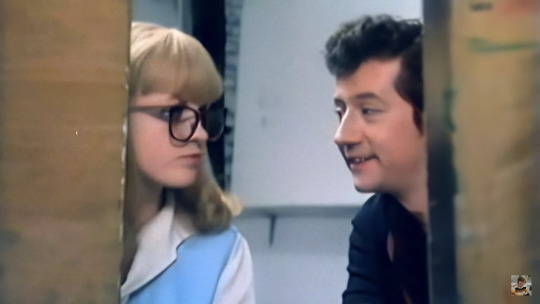
They’re kinda cute idk
John calling Paul a beauty right away mmhmm you know that’s right.
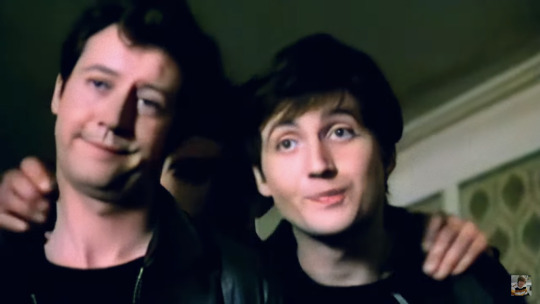
It’s leopold and loeb themselves! The nerk twins! I like how much they attack people together and George is a good back up. It’s amazing how Beatles movies cannot get this dynamic at all right. But Paul being so supportive of Stu… lmao…
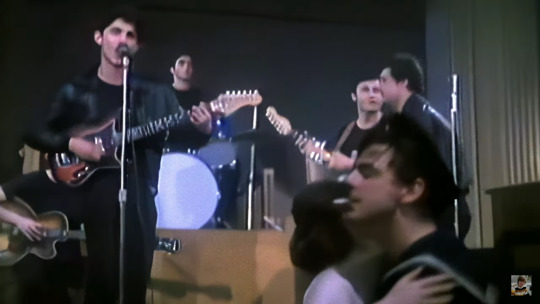
John and Paul goofing off together in the background you know that’s right. I like to hear johns silly little giggle
George always calling Paul “paulie”… so cute
Timeline gets real messed up in the middle bit. They skip over the paris trip of course 😔… imagine someone actually showing Paul and Johns trip like… revolutionary it would be
Enter Brian!
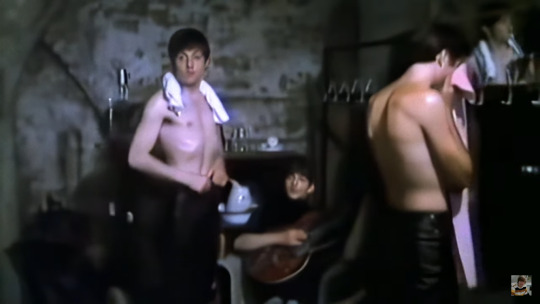
They really said Yah these boys were hot!
I like how they make such a big deal about trying to convey Brian is a GAY man and then the very next scene
Paul and John just out here looking like a married couple
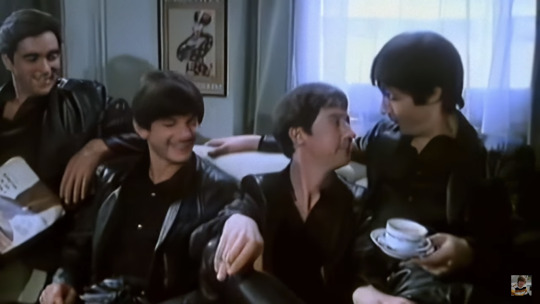
Damn John where you putting that hand!
Damn these bitches really laugh in your face!!! (When you know in reality they were bowing saying oh yes pls mr Epstein)
Paul getting scared of a red light and Brian being like stop being a DIVA Paul. But omg these ungrateful little bitches being like you’re a failure Brian! Shut up Brian! Smh. At least they throw in a scene of John being super nice. There’s lots of scenes of John being really nice.
When John and Cynthia kissed after hearing they got the record deal I seriously thought Paul was gonna lean in and smooch George. The Paul actor gives off big I’ll shag anyone energy which is once again very rare!
Kinda appropriate the movie ends with John getting depressed out of nowhere lol… also very rare to have a message of no Beatle is better than the other
#the birth of the beatles#the beatles#personal#john lennon#paul mccartney#george harrison#ringo starr#brian epstein
73 notes
·
View notes
Text
Is misreading nerk twins as nerk twinks actually wrong
31 notes
·
View notes
Text
Mocking Paul
Tune In’s take on Paul’s “Uncool” Musical Tastes
NOTE: The purpose of this analysis is not to exaggerate the severity of John’s onstage behavior which could have (at least occasionally) been conducted in good fun and camaraderie. The object is to determine whether or not Tune In is capable of presenting John’s disruptive and/or undermining behavior objectively in a way that allows the reader to judge the appropriateness of such behavior.
–
Multiple times throughout the book, Lewisohn writes with seeming approval about John undercutting Paul’s “soft” songs or musical tastes.
Here are five examples of this happening live, onstage:
On page 614, Lewisohn tells us how “Paul would flutter his eyelashes when he sang certain songs,” and calls "Somewhere Over the Rainbow” “one of [Paul’s] flutter numbers, guaranteed to go down a storm with the girls.”
Tune In describes John teasing Paul onstage: “John pointed to Paul, burst into raucous laughter and shouted, ‘God, he’s doing Judy Garland!’ Paul had to keep singing in the knowledge that John was pulling crips and Quasis behind his back or making strange sounds on his guitar to interrupt him.”
Of this, Lewisohn writes, “There were always several simultaneous reasons why an audience couldn’t take their eyes off the Beatles.”
About “Besame Mucho,” we get a quote from Lindy Ness: “When Paul sang ‘Besame Mucho,’ John used to stand behind him and make cripple faces. He had to: Paul was asking for it.” (p761).
During “A Taste of Honey,” John interrupts Paul’s performance by yelling at the audience. Lewisohn calls this behavior an example of “the Nerk Twins’ chemistry” (p1178).
When Paul sings “Till There Was You,” “[John] speaks most of the lines in a persistent piss-taking echo: ‘No, I never heard them at all’ (‘No, he never heard them’)” and Lewisohn writes, “[Paul’s] not even necessarily cross about it—he knows it’ll happen because this is John, and John is his fairground hero.” He also writes, “It’s part of the double-act, one among so many reasons they're special together” (p1178).
Also about “Till There Was You”: “John really had a go at Paul for singing this—but didn’t try to stop him doing it, recognizing there was scope for all kinds of music in this group, to please all kinds of audiences” (p615).
Does it sound like John is preoccupied with projecting a “cool” image? We think so. Perhaps his undermining behavior garnered the praise and approval of a few (like Lindy Ness), but it could hardly be described as supportive of his partner (or reflective of good “leadership”).
And yet, Tune In always assures us that John is being awesome. Sometimes even a "hero."
Instead of dispassionately framing John’s behavior as immature or insecure upstaging, Lewisohn calls John’s attention-seeking antics a part of John and Paul’s “chemistry,” which is “special” and a “[reason] why an audience couldn’t take their eyes off the Beatles.”
And, of course, we hear once again that John is Paul’s “fairground hero.”
Somehow, by mocking Paul doing his “flutter numbers” John is “recognizing there’s scope for all kinds of music.”
Note that, according to Tune In, Paul himself isn’t recognizing scope by choosing and singing the songs (even in the face of mockery); John is recognizing scope by allowing him to do it (while simultaneously making fun of him for it).
–
Our final example is one where John doesn’t even allow Paul to finish his performance, and Tune In uses this to pay John the biggest compliment yet.
Regarding the Beatles’ live performance of Elvis’s hit single “Are You Lonesome Tonight”, only days after its release:
“Paul set down his guitar, clasped the microphone and did his Elvis act, the great solo star crooning his new slow one. It was already going to pot when he went into the long spoken-word middle section about ‘all the world’s a stage,’ which he’d crammed into his brain inside a few hours … and then John just stopped the group dead.
Refusing to be involved in anything so corny, John completely took the piss out of Paul, ripping his close mate and bandmate to shreds in front of everyone. ‘They sent me up rotten,’ Paul says, ‘especially John. They all but laughed me off the stage.’”
So from this description and Paul’s quote, we can surmise that the Beatles had rehearsed and prepared the number, “spoken-word middle section” and all. Why then, did John not object to the corny, spoken-word interlude during rehearsal? Assuming John’s mid-performance "piss-take" was not a comedy routine pre-planned by all the Beatles, this anecdote suggests that John knowingly set Paul up for public ridicule and relished the opportunity to pull the rug out from under him onstage.
To be clear, this would be a perfectly fine choice if Paul was in on the joke and consented to the bit. But deliberately setting Paul up to fail is unambiguously un-cool.
Nevertheless, here’s how Lewisohn justifies John’s behavior:
“This was the way John dealt with things, and he also knew the Beatles must have a solid front line, not back a soloist. As he said, ‘Every group had a lead singer in a pink jacket singing Cliff Richard-type songs. We were the only group that didn’t … and that was how we broke through, by being different'” (586).
There’s no reason to connect John’s quote about “being different” to this anecdote (the footnote indicates his quote is taken from a December 1969 interview called “Pop Goes the Bulldog”) except to spin John’s behavior in the noblest way possible.
Paul wasn’t trying to be “a lead singer in a pink jacket”—he was merely taking the lead vocal just as John and George did in their turn. Did John also stop the band dead in the middle of his own solo spots, in order to ensure they kept a “solid front line” that would allow them to “[break] through by being different"? Of course not. John is simply covering his embarrassment here, insecure about perceived softness, and seeking negative attention.
(For readers who may think we're overblowing this topic, imagine for a moment if Paul was doing this to George Harrison onstage. Would Paul’s behavior be praised?)
It’s outrageous for Lewisohn to spin John's every behavior into something awesome (“audiences couldn’t take their eyes off”; “fairground hero”), visionary (“we broke through by being different”), egalitarian (“solid front line”) broad-minded (“recognizing there was scope for all kinds of music”), and indicative of a GOOD PARTNER, actually (“part of the double-act”; “Nerk Twins’ chemistry”; “special together”).
Meanwhile, Paul is “asking for it” by doing “flutter numbers” “guaranteed to go down a storm with the girls,” “making his eyes big,” being “so corny,” and trying to be “the great solo star,” like a Cliff Richard knockoff “in a pink jacket.”
Does this portrayal look even-handed?
—//—
FULL EXCERPTS:
“[‘Are You Lonesome Tonight’] came out in Britain on Friday, January 13, and they did it the next night at Aintree Institute. Paul set down his guitar, clasped the microphone and did his Elvis act, the great solo star crooning his new slow one. It was already going to pot when he went into the long spoken-word middle section about ‘all the world’s a stage,’ which he’d crammed into his brain inside a few hours … and then John just stopped the group dead.
Refusing to be involved in anything so corny, he completely took the piss out of Paul, ripping his close mate and bandmate to shreds in front of everyone. ‘They sent me up rotten,’ Paul says, ‘especially John. They all but laughed me off the stage.’ This was the way John dealt with things, and he also knew the Beatles must have a solid front line, not back a soloist. As he said, ‘Every group had a lead singer in a pink jacket singing Cliff Richard-type songs. We were the only group that didn’t … and that was how we broke through, by being different’” (586).
—//—
“We always requested Paul to sing ‘Long Tall Sally.’ He used to say, ‘I can’t do it because it kills me throat,’ but then he would. He’d announce, ‘I’m doing this one for these two flossies over here,’ or something like that. Girls used to say his eyes were like mince pies. He had long eyelashes and would deliberately flutter them, and though you knew he was always aware of himself, he was so friendly to everybody that you couldn’t help but like him.’
—BERNADETTE FARRELL
One of the flutter numbers was ‘Over the Rainbow,’ guaranteed to go down a storm with the girls. The song from The Wizard of Oz seemed a strange choice, but the Beatles considered it valid because Gene Vincent did it. Paul sang it somewhere between the two versions, pausing impressively after the heightened ‘Somewhere’ and then sweetly rolling down. Cavern girls would get used to the sight: he made his eyes big, turned his face up and slightly at an angle and fixed his gaze above their heads on a brick at the far end of the center tunnel.
Sometimes John joined in with fine harmonies, but mostly he took the piss. Pete says that during one Cavern performance of ‘Over the Rainbow,’ John leaned back on the piano, pointed to Paul, burst into raucous laughter and shouted, ‘God, he’s doing Judy Garland!’ Paul had to keep singing in the knowledge that John was pulling crips and Quasis behind his back or making strange sounds on his guitar to interrupt him. Yet, if Paul stopped in the middle of the number, John would stare around the stage, the essence of innocence. There were always several simultaneous reasons why an audience couldn’t take their eyes off the Beatles.
Paul took such behavior from no one but John, but also he gave it back and was strong-minded enough to carry on doing what he wanted, knowing how much the audience liked it. He sang these songs well, and added one more to the portfolio at this time, the Broadway show number ‘Till There Was You,’ as covered in a new version by Peggy Lee—or Peggy Leg, as Paul called her. (He was given her record by his cousin Bett Robbins.) John really had a go at Paul for singing this—but didn’t try to stop him doing it, recognizing there was scope for all kinds of music in this group, to please all kinds of audiences … just so long as no one went near jazz” (614-15).
—//—
“LINDY NESS: ‘When Paul sang “Besame Mucho,” John used to stand behind him and make cripple faces. He had to: Paul was asking for it. But John wasn’t particular—he also took the piss out of George and Pete, mostly by imitations of some kind’” (761).
—//—
The tape throws great light on the Nerk Twins’ chemistry. While Paul is singing ‘A Taste of Honey,’ John suddenly shouts ‘SHUT UP TALKING!’ to someone in the audience, interrupting Paul much more than the chatterbox. Paul knows this, and is pitched into laughter. When he sings ‘Till There Was You,’ John—just a beat behind—speaks most of the lines in a persistent piss-taking echo: ‘No, I never heard them at all’ (‘No, he never heard them’). Paul chuckles and plows on; he can’t stop it, and he’s not even necessarily cross about it—he knows it’ll happen because this is John, and John is his fairground hero. It’s part of the double-act: the audience try to watch the singer but can’t tear their eyes off his mate, who’s probably also pulling crips. John couldn’t do this to anyone else without risking a thump, Paul wouldn’t accept it from anyone else; Paul gets to sing his song, John gets to undermine him. It’s just one facet of the complex sibling relationship they’ve always had, one among so many reasons they’re special together” (1178).
76 notes
·
View notes
